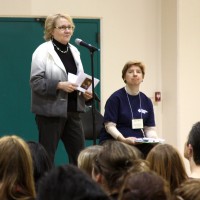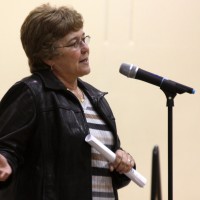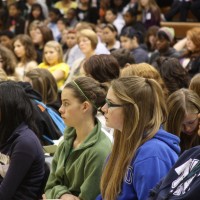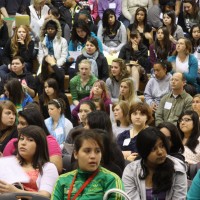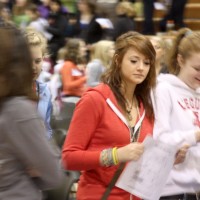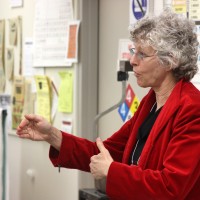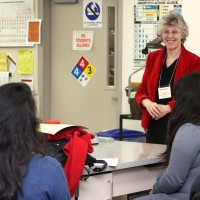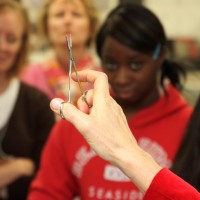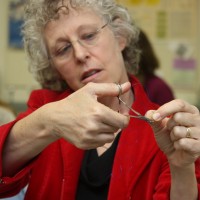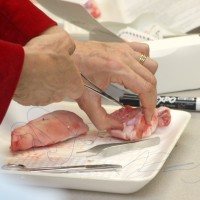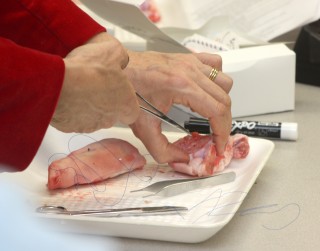This content was published: May 17, 2011. Phone numbers, email addresses, and other information may have changed.
Conference guides young girls into careers less taken
Photos and story by James Hill
What do pigs feet have to do with educating young girls about nontraditional careers? Plenty.
Dr. Kathy Masarie, founder of the Family Empowerment Network and a respected author on family issues, took time out of her hectic schedule to run a workshop on this topic for middle and early high school girls at Portland Community College’s Rock Creek Campus. Her demonstration featured a how-to on suturing pigs feet.
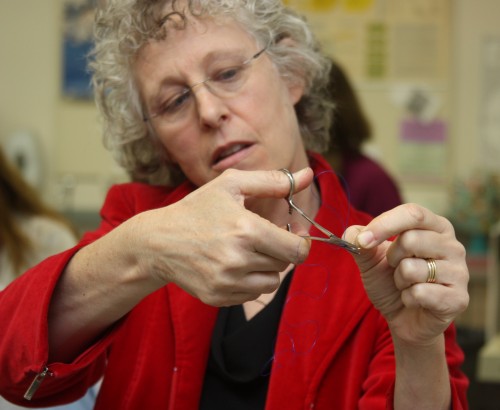
Dr. Kathy Masarie, founder of the Family Empowerment Network and a respected author on family issues, took time out of her hectic schedule to run a workshop on suturing pigs feet.
“Has anybody sutured or seen stitches before?” asked Masarie, who ran a pediatric practice in the 1990s. Not one girl raised her hand.
“Well, this is how doctors learn do it, on pigs feet, because it’s a lot like people’s skin,” she continued. “Lets talk a little bit about the healthcare team. What people are involved in the healthcare system?”
The hands started to go up. The students answered with “Nursing,” or “Surgeons.” These spurred additional answers like, “Anesthesiologist,” “Chiropractor,” “Pediatrician,” and “Dentist.” Then, the demonstration of the suture technique brought the lesson full circle.
Masarie’s demo was part of PCC’s 15th Annual Young Women’s Career Conference, held on Tuesday, April 26 at Rock Creek (17705 N.W. Springville Road). Nearly 500 girls from 41 local schools in the Beaverton, Hillsboro, Forest Grove, Sherwood, Gaston, St. Helens and Tigard-Tualatin school districts as well as Portland Public Schools attended more than 30 hands-on demonstrations.
The goal of the conference was to expose girls in the eighth, ninth and tenth grades around Portland to a plethora of nontraditional careers for women presented by professional women in the community. Some of the presenters included Dr. Masarie; Sandra Flint, a special agent with the Federal Bureau of Investigation; Wendi Cooksey, minerals engineer; and Darci VandenHoek, CSI evidence technician with the Hillsboro Police.
The conference is planned and coordinated by PAVTEC and a group of volunteer educators, business representatives and community people. PAVTEC is a technical prep consortium composed of all of the K-12 school districts within the PCC district, the college, other post-secondary institutions and community organizations.
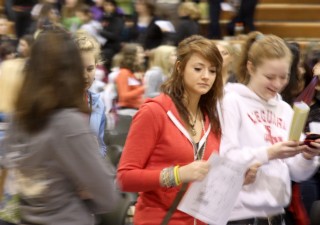
Nearly 500 girls from 41 local schools in the Beaverton, Hillsboro, Forest Grove, Sherwood, Gaston, St. Helens and Tigard-Tualatin school districts as well as Portland Public Schools attended more than 30 hands-on demonstrations.
“A recent survey said that when you ask people in middle school and high school how many possible careers there are available to them they are able, on a good day, to name about ten,” said Rock Creek Campus Dean of Instruction Birgitte Ryslinge. “So, our hope at the end of this day is that they can name 20, 30 or 40 different things they could be doing. I want them all to walk away from here thinking they are college bound; no matter what they want to do, college is something that will get them there.”
Sue Irwin, a Beaverton School District career and technical education coordinator, has been working with PAVTEC for a while on tackling the issue of getting more women into non-traditional careers. She said that the primary focus for this year’s conference was the STEM careers, or jobs in science, technology, engineering or math.
“When it comes time to choose a career for women, we don’t see many entering these,” Irwin said. “It’s frustrating to us because they are high-demand careers with lots of employment opportunities and they are high-wage careers. If you have an interest in science and math the world is your oyster.”
Geoff Schwartz is a teacher at Vernonia Middle School and he and his girls have been coming to PCC’s conference for the past eight years. He said that the hands-on workshops show the students how important math and science is and that any career is achievable with a bit of education.
“It empowers them to want to go to school and to learn,” Schwartz said. “They love it. Many want to come back a second year and I think its great. And they get a kick out seeing of all the different things you can do. I learn a lot about my students such as which kids like what, and it helps me to understand them a little bit better. Sometimes I can cater some of the lessons to some of the kids if they want to do something.”
For Schwartz, he’s seen the positive effect that the conference can have on his students. He talked about his student aide, who attended the conference when she was in the eighth grade and was inspired to want to become a forensics scientist. She is now a senior at Vernonia High School and wants to major in that field in college.
“It gives them an extra edge; gives them an incentive,” he added. “It gives them something to focus on when they get to high school. (Coming to this conference) they understand that’s not that hard and that they can do it. It’s a great conference.”

